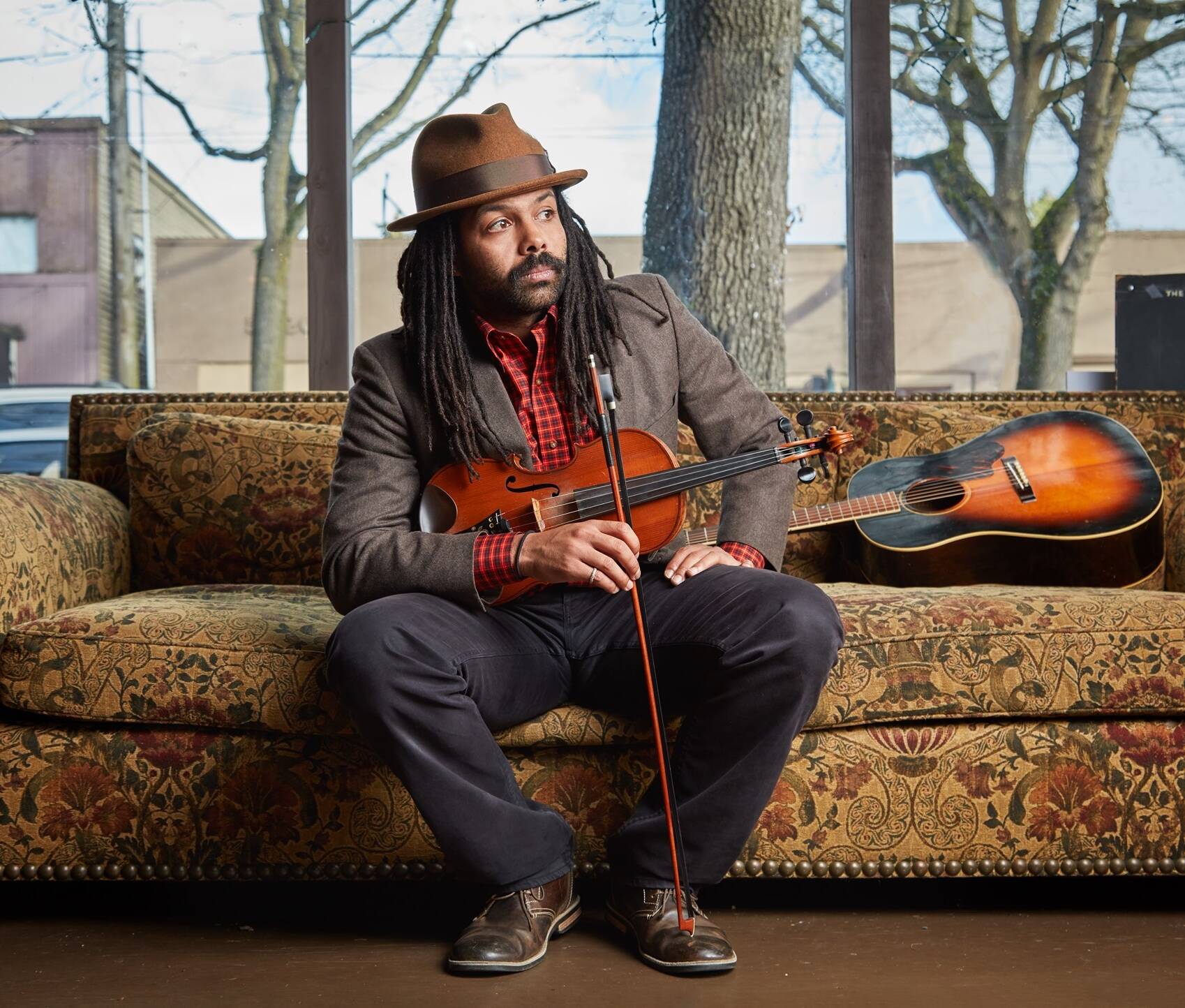Benjamin Hunter, a celebrated multi-instrumentalist, composer, educator and community entrepreneur, will play a concert, “Roots & Shoots of the Diaspora,” at 7 p.m. Friday, Jan. 31, at Snapdragon’s Black Cat Cabaret.
It’s not Hunter’s first concert on the island — he has twice appeared at Vashon Center for the Arts as part of his award-winning American roots duo with Joe Seamons — but his solo concert at Snapdragon will mark an auspicious new beginning for the musician.
Last summer, he moved with his family to the island — fulfilling a longtime dream of owning a home that was born and sustained on the family’s many visits and sojourns on Vashon.
In an interview, Hunter said that a part of him still could not believe the turn of events that finally led him to the property he purchased on Vashon — a place where at first sight, his almost 5-year-old son, Khoeli Rowan, immediately leaped out of the car to run towards one of two majestic walnut trees near the property’s storybook house.
Now, not even a year into his residence here, Hunter said he, his mother, his partner, Rachel Tefft and their son are still “excited to be here and activate these dreams.” The family has named the place Moon Tree Farm, after the meaning of Khoeli Rowan’s name — which doubly derives from the word for tree in the Lesotho language of Sosotho and the Irish tree of lore and magic.
Hunter has long been known in Seattle as a musician and polymath cultural connector who seems to be everywhere at once.
For starters, he will join Gangstagrass, an acclaimed bluegrass/hip-hop ensemble, for a performance at Seattle’s Town Hall on Friday, Jan. 24, but had to turn down an invitation to play with the group at Vashon Center for the Arts on Jan. 25.
He had another engagement that day — presenting a program in conjunction with Seattle Opera and The Rhapsody Project — a multigenerational community music and education organization he co-founded which offers all its programs through the lens of racial and cultural equity.
Hunter is the artistic director of Seattle’s Northwest Folklife Festival, and the co-founder of the Black and Tan Hall, a cultural hub in the South End Hillman City neighborhood — one of multiple community spaces he has helped create in Seattle.
He served on the Seattle Music Commission for six years and currently is a member of the steering committee of the Columbia Hillman Arts & Cultural District.
In recent years, he’s been an artist-in-residence at On the Boards Theater, which has produced his work as a composer, musician and musical director for two major projects — “The Un-[TITLED] Project” and “Black Bois,” an acclaimed production by choreographer and curator Dani Tirrell that has played at both On The Boards and at the Moore Theatre.
And if all that isn’t enough, he also teaches and plays at the Centrum Blues Festival, presented annually by the multidisciplinary nonprofit arts and education center in Port Townsend, and is a sought-after public speaker.
Hunter’s show at Snapdragon is a chance for islanders to benefit from all of his insights working in the intersections of art, music and community engagement, and revel in his storytelling and mastery of instruments including guitar, mandolin, violin and banjo. He’s bringing all those instruments to the show, he said.
Born in Lesotho and raised primarily in Phoenix, Arizona, Hunter’s childhood included extended travel to many different countries, including Zimbabwe, where he lived with his mother.
Classically trained as a violinist, he studied music around the world, but in his adulthood, he detoured from the strictures of classical music — embracing music enfolded in the deep canon of world folk forms.
The genre, according to Hunter, is ecumenical in its power to deepen the bonds of diverse communities — and should be considered inclusive of many forms including hip hop, house music and other styles developed by and for specific communities.
Hunter defines folk tradition broadly as a form that centers and gathers groups of people together in powerful, healing ways — and said that he knows such occurrences regularly happen on Vashon.
“Folk art is something that people do in their living room,” he said.
His decision to become a musician, he said, was born from his conviction that music unites communities.
“It is misconstrued as entertainment, but it has a much more profound and deeper function than that,” he said. “A lot of my work in being a musician centers around the connections and the social, emotional, political and communal health of a community. It’s about telling stories and passing down lessons … I truly believe if we put more emphasis on the interactions centered around art and culture we’d be in a much better place.”
To that end, his show at Snapdragon — which has become a favorite place for him to indulge in delicious, handmade treats — will be a chance for him and his new neighbors on Vashon to come together and make discoveries about each other and the broader world.
Hunter puts it simply, for now, saying that he hasn’t yet decided on his setlist.
“I figured for this show, I’ll play some stuff and get to know folks and eat some pastries,” he said, with a laugh.
There is a $10 suggested donation for the Jan. 31 concert. Find out more about Hunter, his life and music, and listen to his talks at benjaminhuntermusic.com.


